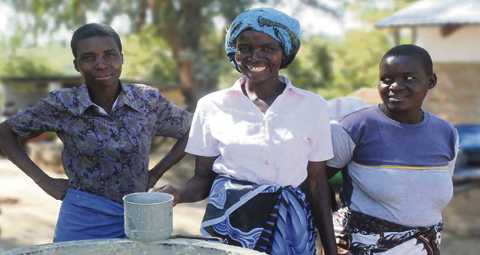September 25 | ![]() 0 COMMENTS
0 COMMENTS ![]() print
print

Making a difference in 12 countries worldwide
In a special report from MARY’S MEALS, we look at the geographical spread of its work ahead of exciting news on ‘Feed our Future’
Most people who know about the work of Mary’s Meals will associate the charity with Malawi, where it has its largest school eeding programme. However, the Scottish charity is currently working in 12 different countries, across Africa, Asia, Latin America, and the Caribbean, supporting more than a million children every day they attend school.
The Mary’s Meals model of engaging local volunteers to cook and serve the daily meals is a very efficient one and the charity’s low cost methods mean it costs just £12.20 to feed a child with Mary’s Meals for a whole school year.
Its second largest programme is in Liberia, West Africa, where more than 130,000 children —including many affected by the 14 year civil war, and more recently, the outbreak of Ebola—have the opportunity to attend school and build a better future for their country, thanks to Mary’s Meals.
In Haiti, thousands of children are living in severely impoverished conditions, but Mary’s Meals provides more than 30,000 school pupils there with hope and the chance to learn. Children like Mirlene, Wilmina and Franky, whose mother Mrs Esaïe Philomena gives up her time to cook at their school, Saint Michel de Saltadère.
“My three children are studying here and Mary’s Meals gives them the energy they need to learn and focus during their five hours of lessons,” she said.
Across Kenya and South Sudan, children face a myriad of difficulties, such as fleeing from war and rebel soldiers, as well as drought and increased food insecurity. Feedback from the Mary’s Meals early years programme in northern Kenya, which supports more than 20,000 nursery-aged children in the rural Turkana region, states: “Very few children are absent because of sickness now and the teachers report active participation in activities.
“The Mary’s Meals feeding programme has enabled children to stay in school and learn and the children enjoy school from an early age because food is provided.”
In India, there are several powerful obstacles that prevent children from attending school. Firstly, the traditional caste system excludes children below a certain social status from government-provided education, while poverty and widespread reliance on young family members working means many children here have never seen the inside of a classroom.
Girls from poor backgrounds are even further disadvantaged in India, owing to a long-established belief in many communities that girl children should remain uneducated. The provision of Mary’s Meals in non-formal education centres as well as government schools is allowing low caste children and girls to receive an education that would otherwise be unattainable.
With 25 percent of the world’s under-nourished people living in India and a glaring gap between the country’s rich and poor, it’s interesting to note that Father Joson, who oversees the work of Mary’s Meals in the country, says: “One of the most important impacts of Mary’s Meals here is that it levels the caste system—we see high and low caste working together to teach and feed the children, which is a beautiful thing.”
Malawi was recently named the poorest country in the world and many families there struggle with extreme poverty and daily hunger. At the moment, 27 percent of all primary school children in Malawi are receiving Mary’s Meals, and expansions happening now will mean more than 18,600 more children can enjoy these life-changing meals, as 35 new schools are added to the programme.
Recently, the programme was expanded to include every school in urban and rural Blantyre, Malawi’s capital.
In Zambia, where Mary’s Meals began feeding just over 20,000 children in October 2014, another 19,000 pupils have been added to the programme this month, across 39 schools. Daniel Phiri, 12, is so grateful for the fortified porridge he is served in school as it helps keep him healthy and gives him the necessary energy to face the 5km walk to and from school. His journey includes a steep incline as well as walking through a river bed, which is heavily flooded during the rainy season.
After waking at 4am, Daniel collects water and bathes before preparing to walk to school.
He used to lack the energy to concentrate in class after walking so far from his home, but now he eats Mary’s Meals every day, he has the energy to work hard in school and he says: “This is important, because I come to school to learn.” Daniel’s favourite subject and he hopes to work for the Zambian government one day.
There are many more children like Daniel, who cannot achieve their full potential without a full stomach and the chance to attend school. Mary’s Meals is committed to reaching the next child in need of a daily meal in school and—hand in hand with some of the world’s poorest communities—walking towards a future where every child can receive a daily meal in their place of education.
Keep an eye on the news section of The Scottish Catholic Observer in the coming weeks for an exciting announcement from Mary’s Meals and information on how you can help ‘Feed Our Future.’










